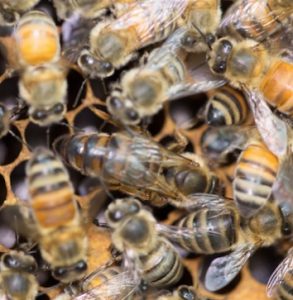-Isabel Dove ’19
In case you haven’t heard the latest buzz: bees have been added to the endangered species list.

Colgate professor, Dr. Ian Helfant’s, honey bees. Professor Helfant recently harvested about 400lbs of honey from his ten hives.
Earlier this month, seven species of bees native to Hawaii were added to the endangered species list by the U.S. Fish and Wildlife Service. As the first bees to be protected under the Endangered Species Act, they will now benefit from authorities’ newfound ability to implement recovery programs and limit harm from outside sources.
Although just recently recognized as endangered, bee populations have been suffering since 2006. The rapid loss of adult bee populations, a phenomenon broadly defined as Colony Collapse Disorder (CCD), has plagued hives worldwide. CCD is likely due to changes in bees’ habitats, diseases, pesticide poisoning, and inadequate nutrition due to a lack of sufficiently diverse food sources. Between 2015-2016, approximately 40% of honeybee colonies in the United States were lost.
Why should we be worried about endangered bee populations?
Bees are pollinators, and therefore are vital elements of ecosystems. Additionally, bees are an essential feature of commercial agriculture, contributing more than $15 billion to U.S. crop production. Bees are responsible for much more than producing honey, as dozens of crops are dependent upon the pollination they provide. Some examples include apples, pears, avocados, coffee, cotton, lemons, walnuts, carrots, cocoa, tomatoes, and watermelon.
If you are understandably distraught over the prospect of losing chocolate and avocados, you may be wondering what you can do to help support bee populations. The Honeybee Conservancy recommends planting a bee-friendly garden, protecting bee habitats, sponsoring hives, and supporting local beekeepers.
Of course, you can also start your own beehive! Here at Colgate, the Sustainability Office is hoping to establish an apiary on campus by this spring. Along with producing honey, the apiary would help support local agriculture and provide research opportunities for students.
Amidst the alarming decline in honeybee populations, it is important to be aware of such a crucial environmental issue and to do our part to help solve this problem. Recognizing bees as endangered species is a significant step in the process of revitalizing bee populations. At Colgate, concerned and passionate students have the potential to take another step in the effort to save the bees with a campus apiary.
Interested in becoming involved with an apiary at Colgate or joining a beekeeping club? Contact Isabel Dove ’19 at idove@colgate.edu.

